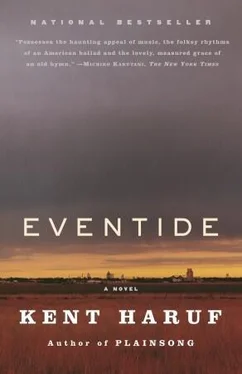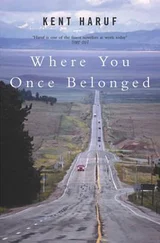Well, here you are, she said. I didn’t know if you’d come back or not.
I said I might, Raymond said.
That doesn’t mean you would. Men say I might, and it doesn’t mean a thing.
I thought it did, he said.
Maybe it does for you.
He took the glass from her hand and drank the rest of the beer. He looked around and all the people nearby appeared to be having a good time.
Let me buy you another beer, she said. This’ll be my round.
Well, no, he said. Ma’am, I don’t believe I could do that. I better buy you one. Wouldn’t you let me do that?
But the next one’s on me. This is a new day, she said.
Ma’am?
I mean women are different now than they used to be. It’s all right for a woman to buy a man a drink in a barroom now.
I wouldn’t know a thing about that, Raymond said. I don’t believe I ever did know anything about women. There was just my mother and then this young girl that lived with us lately.
You mean the girl with the little child I saw visiting you in the hospital.
Yes ma’am. That would be her. That was Victoria Roubideaux. And her little daughter, Katie.
Where are they now? Don’t they still live with you?
No ma’am, not all the time. They’re off at school. In Fort Collins. She’s taking a course of study at college.
Good for her. But don’t you think you could call me something else? Ma’am makes me sound so old.
I might try, he said.
Good, she said. Now why don’t you tell me about them.
Victoria Roubideaux and Katie?
That’s right. They seem to mean a great deal to you.
Well yes, they do. They mean just about everything to me.
He began to talk to Linda May about the girl and her child, and he told her how it was that they had come to live with him and his brother in the country two and a half years ago, and after a while a table was vacated and they sat down across from each other and he allowed her to buy him a drink, though he insisted on buying the next round himself. He sat there in his hat and winter coat until the place closed, talking to this woman. He had never done such a thing before in his life.
It was late when he drove into the graveled drive and stopped at the gate in front of the old gray house. The temperature had fallen to zero and a pale half-sided moon was coming up in the eastern sky. He got out of the pickup and walked up the sidewalk onto the porch. Inside, the house felt empty and quiet. He hung his coat on its peg and went into the bathroom, then climbed the stairs to his bedroom. He turned the light on and everything there seemed quiet and desolate too. He looked around and finally sat down on the bed and pulled his boots off. He got undressed and put on his flannel striped pajamas and lay awake under the heavy blankets in the cold room, unable to sleep yet, thinking about the woman at the bar and about the old man and the boy, and he began to remember the time his brother was courting the woman in town and how that turned out. The moonlight was showing in the room, silver on the wall, and after a while he went to sleep, and in his sleep he dreamed of Victoria and Katie, knocking at the door of some house he didn’t recognize situated in some town he had never seen before in his life.
THERE WAS SNOW FALLING WHEN THEY CAME OUTSIDE Holt County Social Services at the rear of the courthouse in the evening. They had been in the long conference room for an hour, attending a class in the practice of parenthood, while Joy Rae and Richie played with the scarred tedious brightly colored toys in the waiting room and read the little broken-backed books, and during the hour they were all inside it had begun to snow. It was snowing hard now, piling up in the gutters along the street curbs and blowing up against the dark brick walls of the courthouse.
When they came outside, the children were wearing the cheap coats that were too big for them they had bought at the racks at the thrift store, and Betty had on an old calf-length red wool winter coat that was fastened in front with big safety pins. Luther wore only a thin black windbreaker, but he was warm even in that.
Hoo doggie, he said when they stepped out the door. Look at this snow.
We better hurry, Betty said. These kids is going to get cold.
They walked out away from the old high redbrick courthouse. Above them the tiled roof was obscured by the falling snow. They crossed Boston, and, as yet, there were no tracks in the street from any passing cars. The snow came down thickly under the corner streetlight and they went on. The children scuffed their feet, making long dragging marks, and began to fall behind.
Betty turned to look at them. You kids, come on now, she said. Hurry up. Catch up with us.
You ain’t allowed to talk that way, Luther said. You suppose to be nice to them.
I am. I don’t want them to catch cold. We never should of took them out here in this.
How was we going to know it would come on snowing while we was in there in that room?
Well, they ain’t suppose to be out in something like this. Come on.
The children kicked and scuffed along the sidewalks. The atmosphere in the silent town seemed all blue around them. The snow muffled any sound and no one else was out walking. A single car went by, without noise or commotion, a block away, moving at the intersection, stately and quiet as a ship sailing on some silent ghostly sea. They crossed Chicago, then turned up Detroit toward home.
At the trailer they climbed the snow-filled steps and entered the house and removed their shoes at the door and walked out into the room in their stockings. Richie’s had gathered in damp wads around his toes, and his thin heels were scarlet.
You kids get on to bed now and get warm, Luther said. Tomorrow’s school.
Here, Betty said. What was you just telling me about how to talk to these kids right? That teacher said you got to ask them what they want, not just say it.
Oh, yeah, Luther said. Joy Rae, honey, you want anything? You want you a bedtime snack before you go off to sleep?
I want some hot chocolate, Joy Rae said.
What about you, Richie?
I want some pop.
Is he suppose to have pop at night?
I don’t know what he can have, Betty said. She never said nothing about no pop. You just suppose to ask him.
I asked him. He said he wants pop.
What kind of pop?
What kind of pop you want, Richie? You want strawberry? We got black cherry.
Strawberry, Richie said.
Betty brought the drinks and they sat down at the kitchen table. Luther took a package of lasagna from the freezer and put it in the microwave, and it came out steaming and he set it on the table, and Betty got down paper plates left over from a birthday party and they began to eat.
When they were finished, Luther and Betty walked the children back to their bedrooms and left the door open at Richie’s room so he could see the light in the hall. Then Luther went into his and Betty’s room, and he undressed and got into bed in his underwear and stretched out. The bed sagged and complained under his weight. Dear, he called, ain’t you coming to bed?
In a minute, Betty said. But she had stayed in the front room and was sitting on the couch now, watching the snow falling in the front yard and out in Detroit Street. After a while she took up the phone, set it in her lap, and made a call to a house in Phillips. A woman answered.
I’d like to speak to Donna, please, Betty said. I want to talk to Donna Jean.
Who’s calling? the woman said.
This is her mother.
Who?
Her mother. This is Betty Wallace.
You, the woman said. You’re not supposed to call here. Don’t you know that?
I want to talk to her. I ain’t going to do nothing.
Читать дальше








